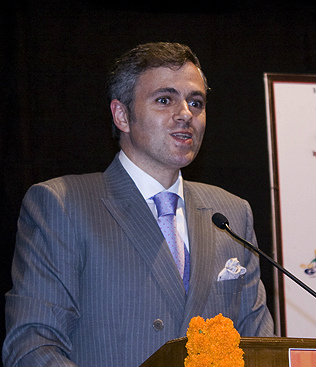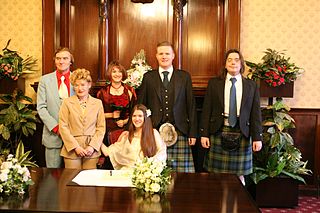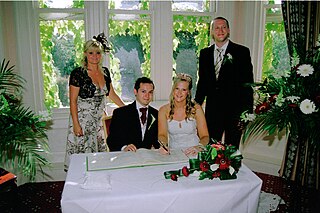
A wedding is a ceremony in which two people are united in marriage. Wedding traditions and customs vary greatly between cultures, ethnicities, races, religions, denominations, countries, social classes, and sexual orientations. Most wedding ceremonies involve an exchange of marriage vows by a couple; a presentation of a gift ; and a public proclamation of marriage by an authority figure or celebrant. Special wedding garments are often worn, and the ceremony is sometimes followed by a wedding reception. Music, poetry, prayers, or readings from religious texts or literature are also commonly incorporated into the ceremony, as well as superstitious customs.
A prenuptial agreement, antenuptial agreement, or premarital agreement, is a written contract entered into by a couple before marriage or a civil union that enables them to select and control many of the legal rights they acquire upon marrying, and what happens when their marriage ends by death or divorce. Couples enter into a written prenuptial agreement to supersede many of the default marital laws that would otherwise apply in the event of divorce, such as the laws that govern the division of property, retirement benefits, savings, and the right to seek alimony with agreed-upon terms that provide certainty and clarify their marital rights. A premarital agreement may also contain waivers of a surviving spouse's right to claim an elective share of the estate of the deceased spouse.

Annulment is a legal procedure within secular and religious legal systems for declaring a marriage null and void. Unlike divorce, it is usually retroactive, meaning that an annulled marriage is considered to be invalid from the beginning almost as if it had never taken place. In legal terminology, an annulment makes a void marriage or a voidable marriage null.
A marriage license is a document issued, either by a religious organization or state authority, authorizing a couple to marry. The procedure for obtaining a license varies between jurisdictions, and has changed over time. Marriage licenses began to be issued in the Middle Ages, to permit a marriage that would otherwise be illegal.
Armed Forces Act (AFSPA), 1958 is an act of the Parliament of India that grants special powers to the Indian Armed Forces to maintain public order in "disturbed areas". According to the Disturbed Areas Act, 1976 once declared 'disturbed', the area has to maintain status quo for a minimum of 3 months. One such act passed on 11 September 1958 was applicable to the Naga Hills, then part of Assam. In the following decades it spread, one by one, to the other Seven Sister States in India's northeast. Another one passed in 1983 and applicable to Punjab and Chandigarh was withdrawn in 1997, roughly 14 years after it came to force. An act passed in 1990 was applied to Jammu and Kashmir and has been in force since.

Omar Abdullah is an Indian politician who is currently serving as the chief minister of the union territory of Jammu and Kashmir. He had previously served as the chief minister of the state of Jammu and Kashmir between 2009 and 2014, and is the current vice president of the Jammu and Kashmir National Conference, a position he has held since 2009. Abdullah also served as a member of parliament in the Lok Sabha from 1998 to 2009, representing the Srinagar parliamentary constituency, and was a union minister of State for External Affairs.
A member of the Legislative Assembly (MLA) is a representative elected by the voters of an electoral district (constituency) to the legislature of State government in the Indian system of government. From each constituency, the people elect one representative who then becomes a member of the Legislative Assembly (MLA). Each state has between seven and nine MLAs for every Member of Parliament (MP) that it has in the Lok Sabha, the lower house of India's bicameral parliament. There are also members in three unicameral legislatures in Union Territories: the Delhi Legislative Assembly, Jammu and Kashmir Legislative Assembly and the Puducherry Legislative Assembly. Only a Member of the Legislative Assembly can work as a minister for more than 6 months. If a non-Member of the Legislative Assembly becomes a Chief Minister or a minister, he must become an MLA within 6 months to continue in the job. Only a Member of the Legislative Assembly can become the Speaker of the Legislature.

Marriage is available in England and Wales to both opposite-sex and same-sex couples and is legally recognised in the forms of both civil and religious marriage. Marriage laws have historically evolved separately from marriage laws in other jurisdictions in the United Kingdom. There is a distinction between religious marriages, conducted by an authorised religious celebrant, and civil marriages, conducted by a state registrar. The legal minimum age to enter into a marriage in England and Wales is 18 since 27 February 2023. Previously the minimum age of marriage was 16, with parental permission. This also applies to civil partnerships.
A marriage certificate is an official statement that two people are married. In most jurisdictions, a marriage certificate is issued by a government official only after the civil registration of the marriage.

Marriage in Scotland is recognised in the form of both civil and religious unions between individuals. Due to Scotland's history as a previously independent country, the laws around marriage developed differently in Scotland compared to other jurisdictions that also became part of the United Kingdom. This was partly a consequence of differences in Scots law and also the role and influence of the national church of Scotland, the Church of Scotland. The tradition of couples from England and Wales eloping to Scotland to marry at border towns such as Gretna Green was due to England, at the time, having much higher minimum ages for marriage without parental consent than were required in Scotland. Today the difference in minimum ages is much closer with the legal minimum age to enter into a marriage in Scotland being sixteen years without requiring parental consent while England today allows marriage at sixteen with parental consent but eighteen without.
Christian personal law or family law regulates adoption, divorce, guardianship, marriage and succession in India. The provisions of canon law concerning marriage are recognised as the personal law of Roman Catholics in India. Marriages of Indian Christians are regulated by the Indian Christian Marriage Act, 1872. Christian personal law is not applicable in Goa; instead, the Goa civil code is the set of civil laws that regulate the residents of the Indian state of Goa. In India as a whole, there are religion-specific civil codes that separately govern adherents of different religions. Goa is an exception to that rule in that a single secular code governs all Goans, irrespective of religion, ethnicity or linguistic affiliation.
The matrimonial law of Singapore categorises marriages contracted in Singapore into two categories: civil marriages and Muslim marriages. The Registry of Marriage (ROM) administers civil marriages in accordance to the Women's Charter, while the Registry of Muslim Marriages (ROMM) administers Muslim marriages in accordance to the Administration of Muslim Law Act (AMLA). All marriages performed in Singapore must be registered with the relevant registry in order to be legally valid.

Scots family law is the body of laws in Scotland which regulate certain aspects of adult relationships and the rights and obligations in respect of children.
The Special Marriage Act, 1954 is an Act of the Parliament of India with provision for secular civil marriage for people of India and all Indian nationals in foreign countries, irrelevant of the religion or faith followed by either party. The Act originated from a piece of legislation proposed during the late 19th century. Marriages solemnized under Special Marriage Act are not governed by personal laws and is considered to be secular.
The Hindu Marriage Act (HMA) is an act of the Parliament of India enacted in 1955. Three other important acts were also enacted as part of the Hindu Code Bills during this time: the Hindu Succession Act (1956), the Hindu Minority and Guardianship Act (1956), the Hindu Adoptions and Maintenance Act (1956).
India does not recognise same-sex marriage, civil unions or other forms of partnerships, but provides some limited legal recognition to cohabiting same-sex couples in the form of live-in relationships. Several same-sex couples have married in traditional Hindu ceremonies since the late 1980s; however, these marriages are not registered with the state and couples do not enjoy all the same rights and benefits as married opposite-sex couples. The Supreme Court of India in August 2022 provided social security rights to those in same-sex live-in relationships while also recognising same-sex couples as being part of a "family unit".

The Jammu and Kashmir Legislative Council was the upper house of the legislature of the erstwhile state of Jammu and Kashmir, India.
Divorcein South African law refers to the termination of a marital union, the canceling of the legal duties and responsibilities of marriage and the dissolving of the bonds of matrimony between a married couple. Divorce is unlike annulment, which declares the marriage null and void. Divorce requires the sanction of a court in a legal process. The legal process of divorce may also involve issues of alimony, child custody, child support, distribution of property and division of debt.

A civil, or registrar, ceremony is a non-religious legal marriage ceremony performed by a government official or functionary. In the United Kingdom, this person is typically called a registrar. In the United States, civil ceremonies may be performed by town, city, or county clerks, judges or justices of the peace, or others possessing the legal authority to support the marriage as the wedding officiant.

The Jammu and Kashmir Public Safety Act, 1978 (PSA) is a preventive detention law under which a person is taken into custody to prevent them from acting harmfully against "the security of the state or the maintenance of the public order" in the Indian state of Jammu and Kashmir. Whereas PSA applies only to Jammu and Kashmir, it is very similar to the National Security Act that is used by the central and other state governments of India for preventive detention.









